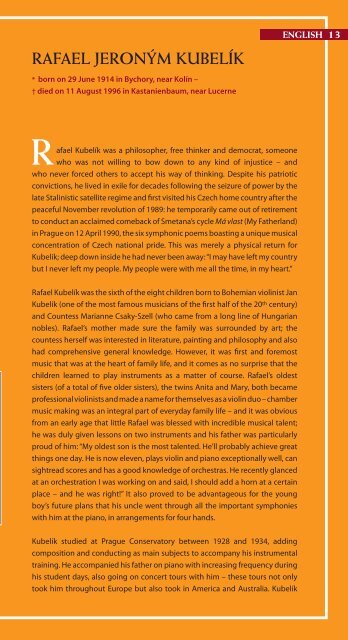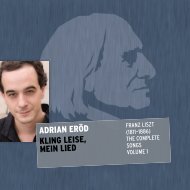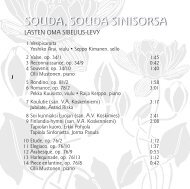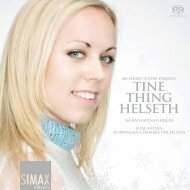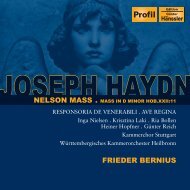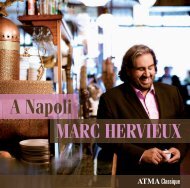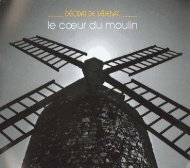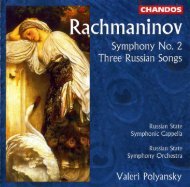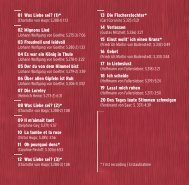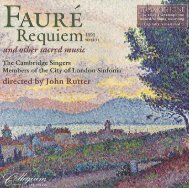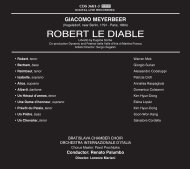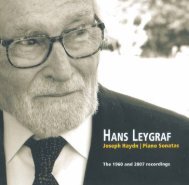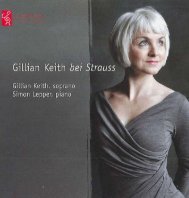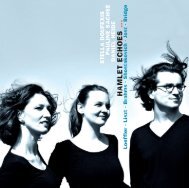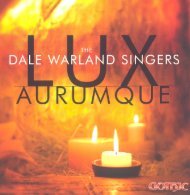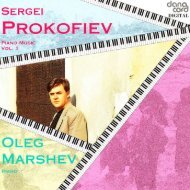RAFAEL KUBELÍK
RAFAEL KUBELÍK
RAFAEL KUBELÍK
Sie wollen auch ein ePaper? Erhöhen Sie die Reichweite Ihrer Titel.
YUMPU macht aus Druck-PDFs automatisch weboptimierte ePaper, die Google liebt.
ENGLISH 13<br />
Rafael jeronÝm Kubelík<br />
* born on 29 June 1914 in Bychory, near Kolín –<br />
† died on 11 August 1996 in Kastanienbaum, near Lucerne<br />
Rafael Kubelík was a philosopher, free thinker and democrat, someone<br />
who was not willing to bow down to any kind of injustice – and<br />
who never forced others to accept his way of thinking. Despite his patriotic<br />
convictions, he lived in exile for decades following the seizure of power by the<br />
late Stalinistic satellite regime and first visited his Czech home country after the<br />
peaceful November revolution of 1989: he temporarily came out of retirement<br />
to conduct an acclaimed comeback of Smetana’s cycle Má vlast (My Fatherland)<br />
in Prague on 12 April 1990, the six symphonic poems boasting a unique musical<br />
concentration of Czech national pride. This was merely a physical return for<br />
Kubelík; deep down inside he had never been away: “I may have left my country<br />
but I never left my people. My people were with me all the time, in my heart.”<br />
Rafael Kubelík was the sixth of the eight children born to Bohemian violinist Jan<br />
Kubelík (one of the most famous musicians of the first half of the 20 th century)<br />
and Countess Marianne Csaky-Szell (who came from a long line of Hungarian<br />
nobles). Rafael’s mother made sure the family was surrounded by art; the<br />
countess herself was interested in literature, painting and philosophy and also<br />
had comprehensive general knowledge. However, it was first and foremost<br />
music that was at the heart of family life, and it comes as no surprise that the<br />
children learned to play instruments as a matter of course. Rafael’s oldest<br />
sisters (of a total of five older sisters), the twins Anita and Mary, both became<br />
professional violinists and made a name for themselves as a violin duo – chamber<br />
music making was an integral part of everyday family life – and it was obvious<br />
from an early age that little Rafael was blessed with incredible musical talent;<br />
he was duly given lessons on two instruments and his father was particularly<br />
proud of him: “My oldest son is the most talented. He’ll probably achieve great<br />
things one day. He is now eleven, plays violin and piano exceptionally well, can<br />
sightread scores and has a good knowledge of orchestras. He recently glanced<br />
at an orchestration I was working on and said, I should add a horn at a certain<br />
place – and he was right!” It also proved to be advantageous for the young<br />
boy’s future plans that his uncle went through all the important symphonies<br />
with him at the piano, in arrangements for four hands.<br />
Kubelík studied at Prague Conservatory between 1928 and 1934, adding<br />
composition and conducting as main subjects to accompany his instrumental<br />
training. He accompanied his father on piano with increasing frequency during<br />
his student days, also going on concert tours with him – these tours not only<br />
took him throughout Europe but also took in America and Australia. Kubelík


